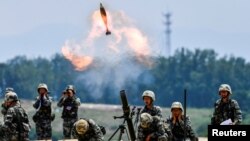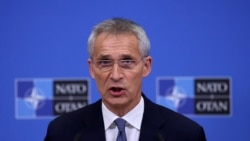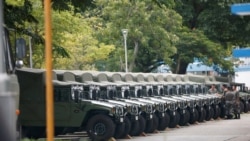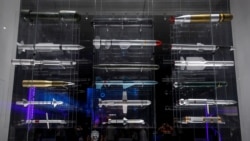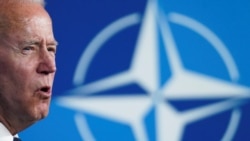China wasn’t on the agenda at this week’s NATO defense ministers meeting, but by the time the gathering concluded, the secretary-general had said the military alliance needs to respond to the challenges presented by China’s rise.
“We see the whole global balance of power is shifting because of the rise of China,” Jens Stoltenberg told reporters Thursday at a press conference in Brussels.
China is “heavily modernizing its military capabilities, including advanced nuclear systems and long-range missile systems," and "we see China coming much closer to us, not least in cyberspace,” he said. And in response, the allies agreed “to do more together."
Without giving details, Stoltenberg said NATO would cooperate on a strategy involving areas such as artificial intelligence and technologically advanced weapon systems, “relevant to the challenges posed by the rise of China.”
He said that applies not only to Europe, NATO’s traditional focus, but also to challenges in the Asia Pacific, where “the rise of China just makes it even more important that Europe and North America stand together in NATO.”
At their June meeting, the allies had agreed to strengthen their relationships with partners in the Asia Pacific, which include New Zealand, Australia, South Korea and Japan.
The Chinese Embassy in Washington did not respond to VOA Mandarin’s request for a response to Stoltenberg’s remarks.
In a recent interview with the Financial Times, Stoltenberg said that countering the security threat from the rise of China will be an important part of NATO’s future rationale.
“NATO is an alliance of North America and Europe. But this region faces global challenges: terrorism, cyber, but also the rise of China. So when it comes to strengthening our collective defense, that’s also about how to address the rise of China,” Stoltenberg told the Financial Times. “What we can predict is that the rise of China will impact our security. It already has.”
He pointed out that China has had an impact on European security through its cyber capabilities, new technologies and long-range missiles.
Bruce Jones, director and a senior fellow at the Brookings Institution, a Washington think tank, said Stoltenberg’s remarks revealed an important shift of the military alliance.
“It's an important shift of NATO inside NATO,” he told VOA Mandarin in a phone interview. “There's been a debate about whether NATO should concentrate on Russia, Europe, or whether it should be part of a wider American reorientation towards China.”
He added that the statement from the secretary-general is “a signal about the direction that he is going to go and that he has some support for changing the orientation.”
Stoltenberg said NATO will adopt a new strategic concept next summer, which will outline the group’s strategies for the next 10 years. The current 2010 version does not mention China.
In an interview with Politico earlier this month, Stoltenberg also stressed that NATO needs to strengthen its engagement with China.
“We don't regard China as an adversary or an enemy,” he said. “We need to engage with China on important issues such as climate change — there's no way to reduce emissions enough in the world without also including China.”
New threat
The 30-member coalition was established after World War II, and its previous focus was on Russia and terrorism. NATO first mentioned the threat from China in its 2019 summit communiqué.
As China expands its influence globally in a more aggressive manner, NATO’s concern about China’s rise has grown. In a joint communiqué in June, NATO leaders accused China of rapidly expanding its nuclear arsenal and being opaque in implementing its military modernization.
“China’s stated ambitions and assertive behavior present systemic challenges to the rules-based international order and to areas relevant to alliance security,” the communiqué said.
Dan Hamilton, a senior fellow at Johns Hopkins University's SAIS Foreign Policy Institute and director of the postdoctoral program on “The United States, Europe, and World Order,” told VOA Mandarin that the 27 countries in the European Union are feeling China’s presence in the region.
China is the EU’s No. 1 trading partner and the source of billions of dollars per year in direct investment, particularly in energy, according to a recent VOA Mandarin report. Beijing’s relations vary from one EU nation to the next, with east-central European nations such as Hungary and Serbia eager to engage while Western European countries are more skeptical.
“China is coming to us. It’s about China being present in Europe as sort of a power that includes investments in defense-related supply chain, investments in ports,” Hamilton said in a phone interview.
In their June joint communique, NATO leaders expressed concern over China’s military cooperation with Russia in the Euro-Atlantic region.
“China and Russia are collaborating more closely together, and that might affect the risk calculation each of them might take with regards to Western interests,” Hamilton said.
“Russia might feel a bit more emboldened when it comes to issues like Ukraine or Belarus or military exercises if it feels China is supporting it,” he added. “Similarly, China might feel it has Russian support, then it might be able to be a bit more adventurous than otherwise it would ordinarily be.”
US-EU cooperation
The change in NATO's view of China echoes that of Washington. The Biden administration believes that the competition between the West and China is a confrontation between democratic values and authoritarianism.
But cooperation between the EU and the U.S. has encountered obstacles in the past few years.
Former U.S. President Donald Trump publicly questioned the value of NATO. Some European countries have proposed the concept of "strategic autonomy" and demanded a reduction in their dependence on U.S. military support.
After Biden took office in January 2021, NATO and the White House resumed closer contact. Stoltenberg visited Washington this month, and U.S. Secretary of Defense Lloyd Austin participated in NATO's in-person meetings Thursday and Friday.
Jones, of Brookings, said that between the U.S. and EU, there’s now a strong willingness to cooperate and counter the rise of China. “People are willing to put a lot of energy and effort into making that alignment work, so although Europe has a question mark about this administration, and potentially about future administrations, these shared interests are greater than the uncertainty.”
Lin Yang contributed to this report.




